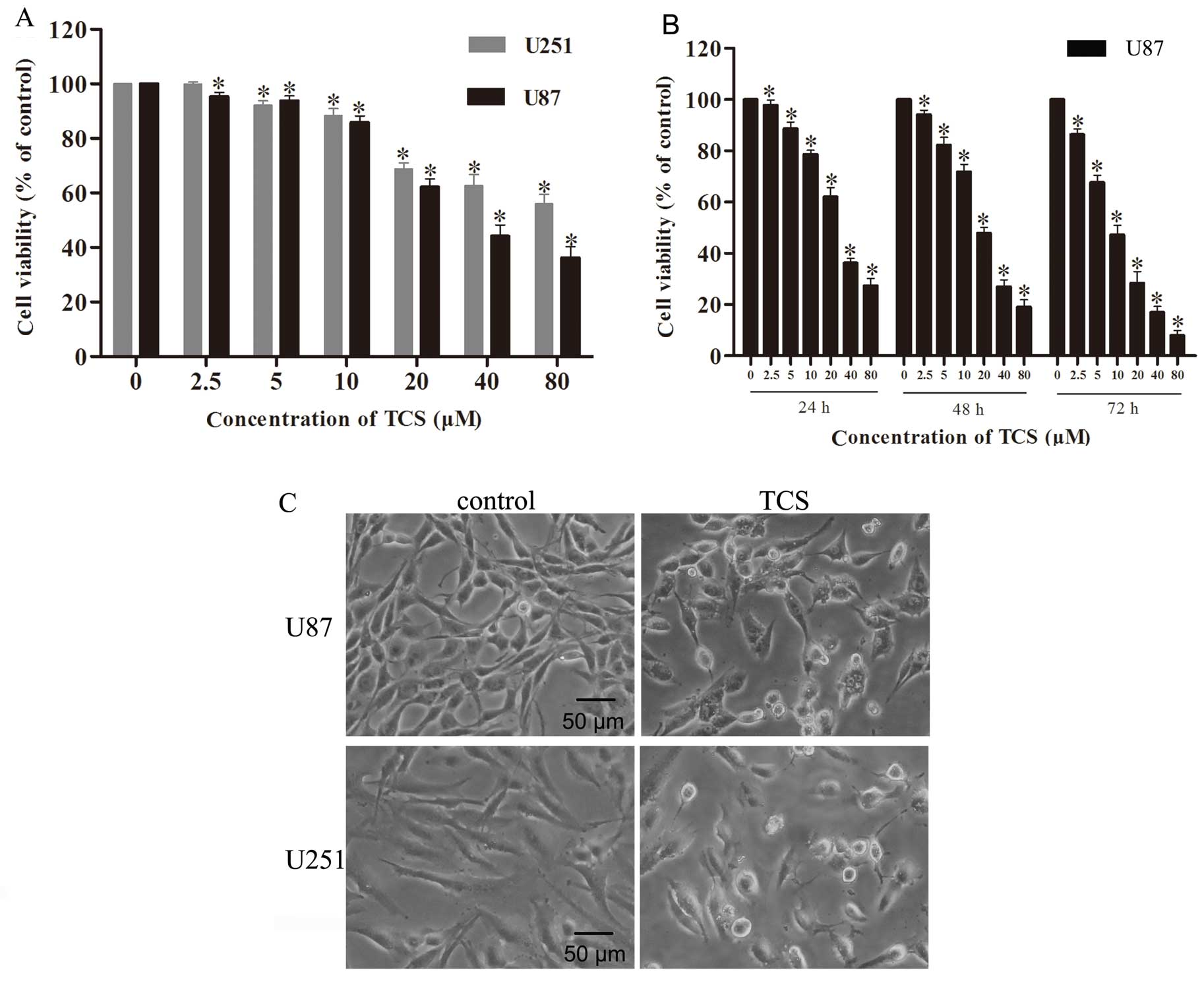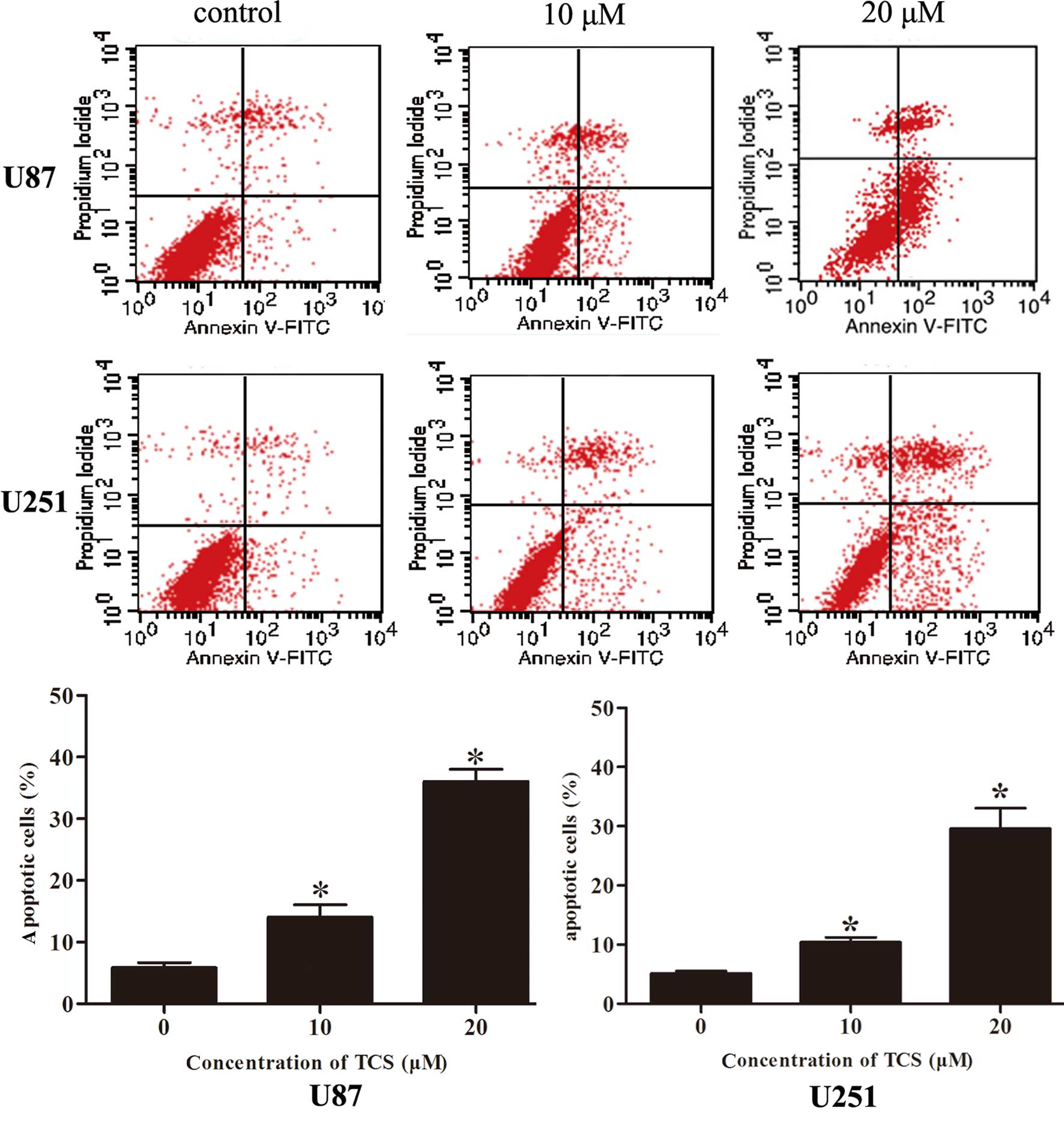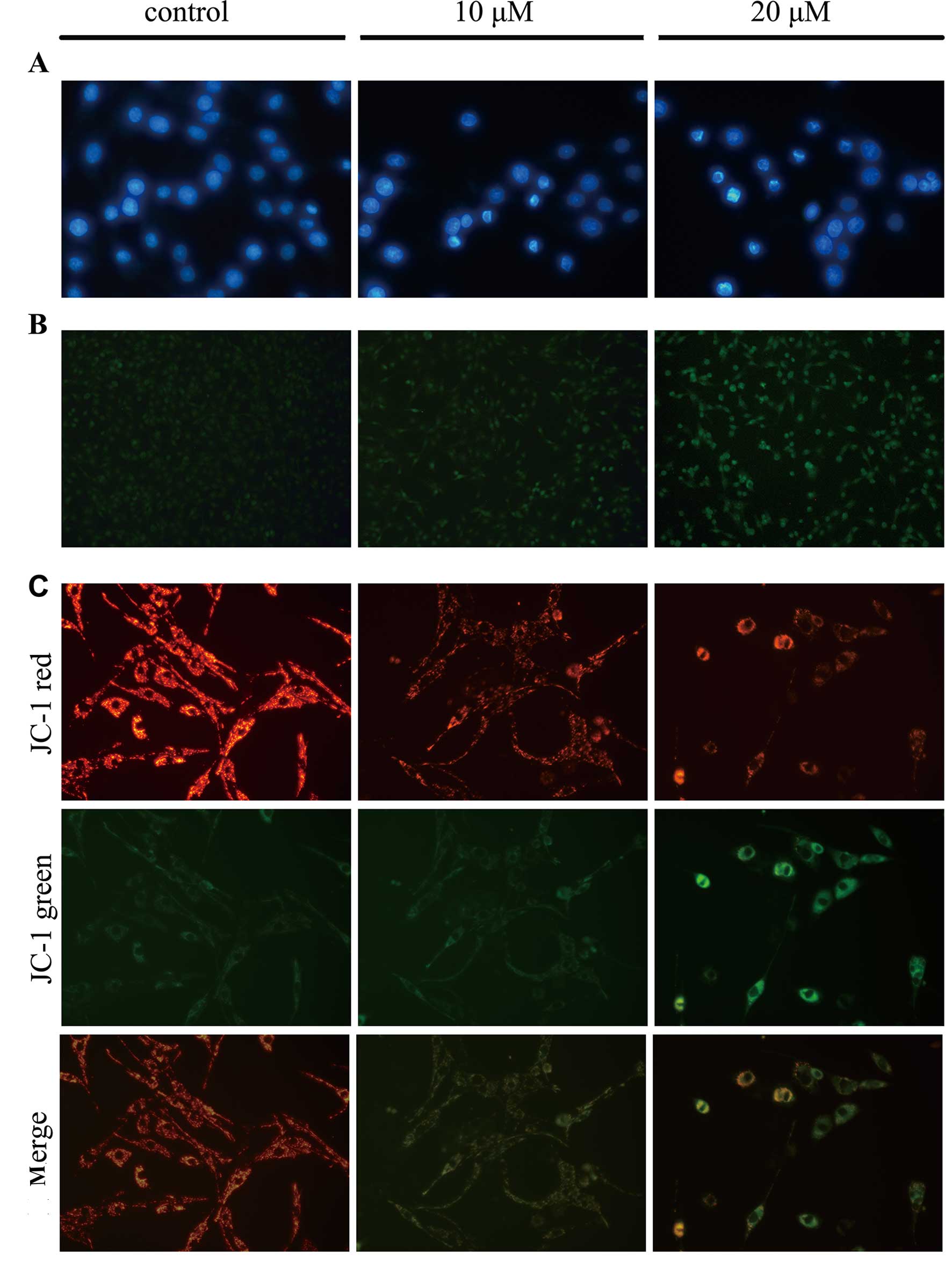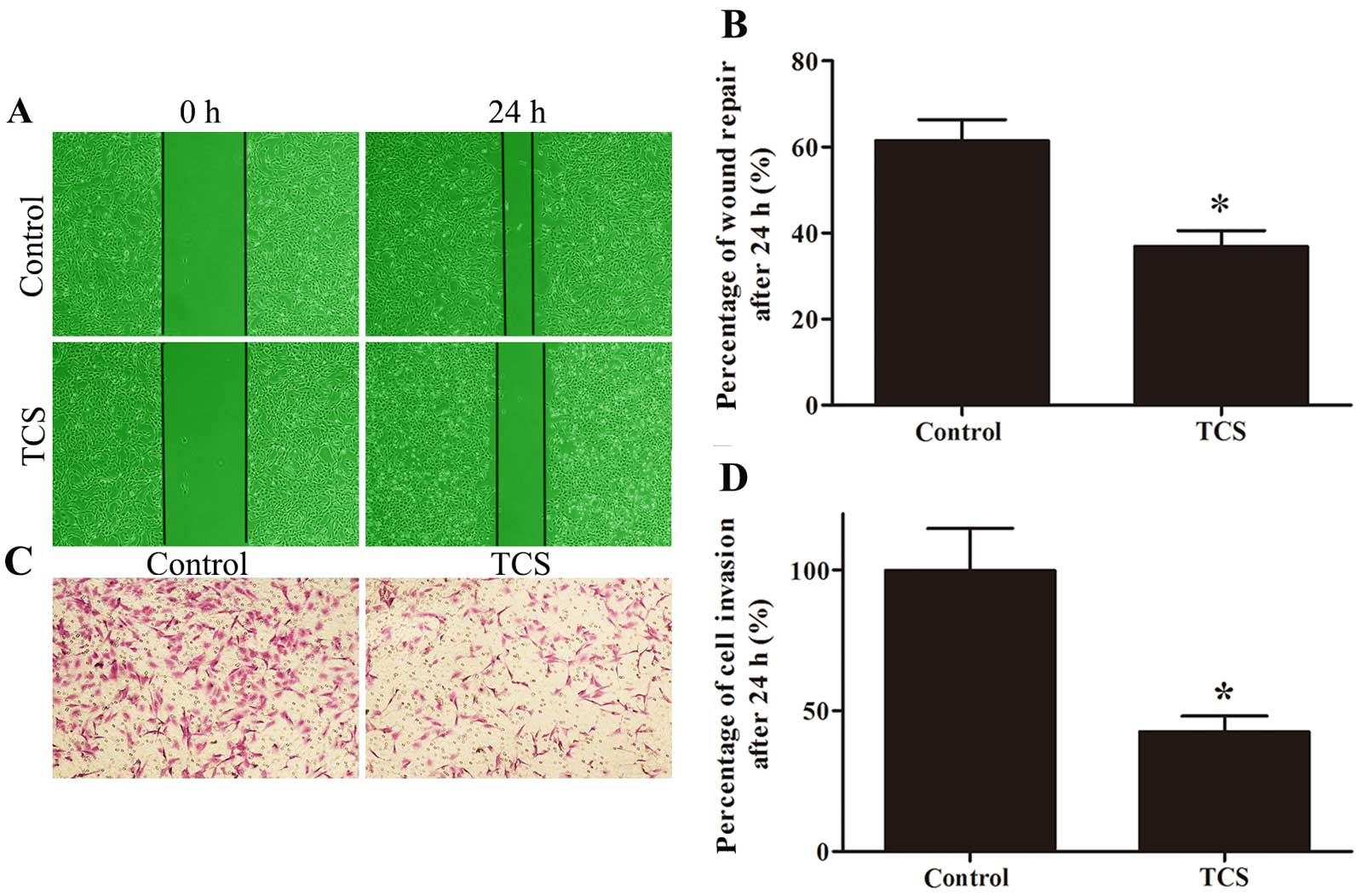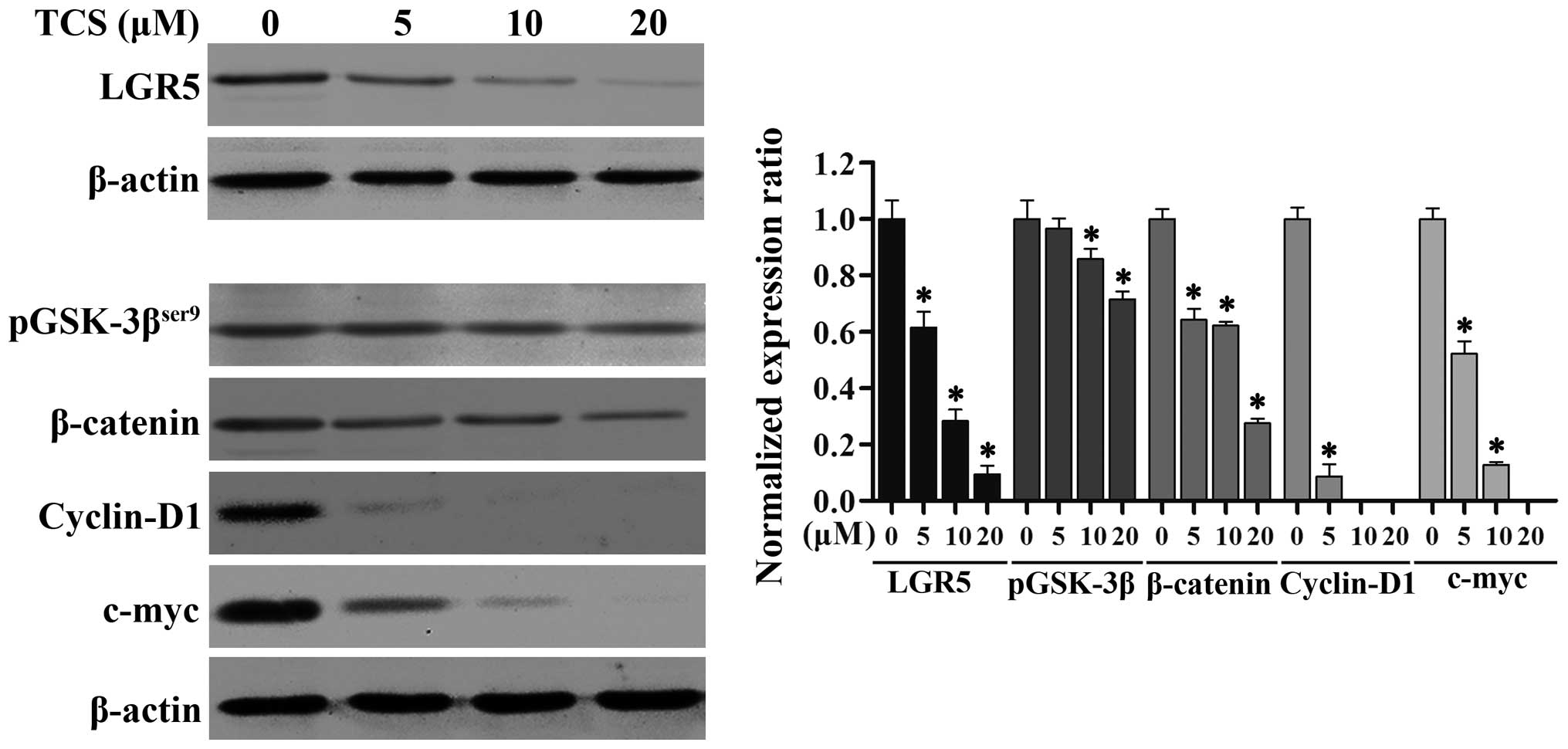|
1
|
Jansen M, Yip S and Louis DN: Molecular
pathology in adult gliomas: Diagnostic, prognostic, and predictive
markers. Lancet Neurol. 9:717–726. 2010. View Article : Google Scholar : PubMed/NCBI
|
|
2
|
Wen PY and Kesari S: Malignant gliomas in
adults. N Engl J Med. 359:492–507. 2008. View Article : Google Scholar : PubMed/NCBI
|
|
3
|
Fortin Ensign SP, Mathews IT, Symons MH,
Berens ME and Tran NL: Implications of Rho GTPase signaling in
glioma cell invasion and tumor progression. Front Oncol. 3:2412013.
View Article : Google Scholar : PubMed/NCBI
|
|
4
|
Maraganore JM, Joseph M and Bailey MC:
Purification and characterization of trichosanthin. Homology to the
ricin A chain and implications as to mechanism of abortifacient
activity. J Biol Chem. 262:11628–11633. 1987.PubMed/NCBI
|
|
5
|
Zhang XJ and Wang JH: Homology of
trichosanthin and ricin A chain. Nature. 321:477–478. 1986.
View Article : Google Scholar : PubMed/NCBI
|
|
6
|
Sha O, Niu J, Ng TB, Cho EY, Fu X and
Jiang W: Antitumor action of trichosanthin, a type 1
ribosome-inactivating protein, employed in traditional Chinese
medicine: A mini review. Cancer Chemother Pharmacol. 71:1387–1393.
2013. View Article : Google Scholar : PubMed/NCBI
|
|
7
|
Zhang CY, Gong YX, Ma H, An CC and Chen
DY: Trichosanthin induced calcium-dependent generation of reactive
oxygen species in human choriocarcinoma cells. Analyst.
125:1539–1542. 2000. View
Article : Google Scholar : PubMed/NCBI
|
|
8
|
Zhang C, Gong Y, Ma H, An C, Chen D and
Chen ZL: Reactive oxygen species involved in trichosanthin-induced
apoptosis of human choriocarcinoma cells. Biochem J. 355:653–661.
2001. View Article : Google Scholar : PubMed/NCBI
|
|
9
|
Wang P, Chen LL, Yan H and Li JC:
Trichosanthin suppresses HeLa cell proliferation through inhibition
of the PKC/MAPK signaling pathway. Cell Biol Toxicol. 25:479–488.
2009. View Article : Google Scholar
|
|
10
|
Wang P, Xu S, Zhao K, Xiao B and Guo J:
Increase in cytosolic calcium maintains plasma membrane integrity
through the formation of microtubule ring structure in apoptotic
cervical cancer cells induced by trichosanthin. Cell Biol Int.
33:1149–1154. 2009. View Article : Google Scholar : PubMed/NCBI
|
|
11
|
Cui L, Song J, Wu L, Huang L, Wang Y,
Huang Y, Yu H, Huang Y, You CC and Ye J: Smac is another pathway in
the anti-tumour activity of trichosanthin and reverses
trichosanthin resistance in CaSki cervical cancer cells. Biomed
Pharmacother. 69:119–124. 2015. View Article : Google Scholar : PubMed/NCBI
|
|
12
|
Dou CM and Li JC: Effect of extracts of
trichosanthes root tubers on HepA-H cells and HeLa cells. World J
Gastroenterol. 10:2091–2094. 2004. View Article : Google Scholar : PubMed/NCBI
|
|
13
|
Fang EF, Zhang CZ, Zhang L, Wong JH, Chan
YS, Pan WL, Dan XL, Yin CM, Cho CH and Ng TB: Trichosanthin
inhibits breast cancer cell proliferation in both cell lines and
nude mice by promotion of apoptosis. PLoS One. 7:e415922012.
View Article : Google Scholar : PubMed/NCBI
|
|
14
|
Zheng YT, Zhang WF, Ben KL and Wang JH: In
vitro immuno-toxicity and cytotoxicity of trichosanthin against
human normal immunocytes and leukemia-lymphoma cells.
Immunopharmacol Immunotoxicol. 17:69–79. 1995. View Article : Google Scholar : PubMed/NCBI
|
|
15
|
Li J, Xia X, Ke Y, Nie H, Smith MA and Zhu
X: Trichosanthin induced apoptosis in HL-60 cells via mitochondrial
and endoplasmic reticulum stress signaling pathways. Biochim
Biophys Acta. 1770:1169–1180. 2007. View Article : Google Scholar : PubMed/NCBI
|
|
16
|
Li J, Xia X, Nie H, Smith MA and Zhu X:
PKC inhibition is involved in trichosanthin-induced apoptosis in
human chronic myeloid leukemia cell line K562. Biochim Biophys
Acta. 1770:63–70. 2007. View Article : Google Scholar
|
|
17
|
Byers VS, Levin AS, Malvino A, Waites L,
Robins RA and Baldwin RW: A phase II study of effect of addition of
trichosanthin to zidovudine in patients with HIV disease and
failing antiretroviral agents. AIDS Res Hum Retroviruses.
10:413–420. 1994. View Article : Google Scholar : PubMed/NCBI
|
|
18
|
McGrath MS, Hwang KM, Caldwell SE, Gaston
I, Luk KC, Wu P, Ng VL, Crowe S, Daniels J and Marsh J: GLQ223: An
inhibitor of human immunodeficiency virus replication in acutely
and chronically infected cells of lymphocyte and mononuclear
phagocyte lineage. Proc Natl Acad Sci USA. 86:2844–2848. 1989.
View Article : Google Scholar : PubMed/NCBI
|
|
19
|
Yang N, Li Z, Jiao Z, Gu P, Zhou Y, Lu L
and Chou KY: A Trichosanthin-derived peptide suppresses type 1
immune responses by TLR2-dependent activation of CD8(+)CD28(−)
Tregs. Clin Immunol. 153:277–287. 2014. View Article : Google Scholar : PubMed/NCBI
|
|
20
|
Tang NL, Chan WL, Ke YO, Mak MK, Lai FM
and Tam SC: Acute renal failure and proximal tubule lesions after
trichosanthin injection in rats. Exp Mol Pathol. 64:78–89. 1997.
View Article : Google Scholar : PubMed/NCBI
|
|
21
|
Li F, Mei Y, Wang Y, Chen C, Tu J, Xiao B
and Xu L: Trichosanthin inhibits antigen-specific T cell expansion
through nitric oxide-mediated apoptosis pathway. Cell Immunol.
234:23–30. 2005. View Article : Google Scholar : PubMed/NCBI
|
|
22
|
Ng TB, Liu WK, Tsao SW and Yeung HW:
Effect of trichosanthin and momorcharins on isolated rat
hepatocytes. J Ethnopharmacol. 3:81–87. 1994. View Article : Google Scholar
|
|
23
|
Garcia PA, Bredesen DE, Vinters HV,
Graefin von Einsiedel R, Williams RL, Kahn JO, Byers VS, Levin AS,
Waites LA and Messing RO: Neurological reactions in HIV-infected
patients treated with trichosanthin. Neuropathol Appl Neurobiol.
19:402–405. 1993. View Article : Google Scholar : PubMed/NCBI
|
|
24
|
Ng TB, Kwong WH and Yeung HW: Intravenous
injections of the ribosome inactivating protein trichosanthin did
not affect methionine enkephalin and β-endorphin levels in the
mouse brain and pituitary. Biochem Mol Biol Int. 39:985–989.
1996.PubMed/NCBI
|
|
25
|
Rot S, Taubert H, Bache M, Greither T,
Würl P, Eckert AW, Schubert J, Vordermark D and Kappler M: A novel
splice variant of the stem cell marker LGR5/GPR49 is correlated
with the risk of tumor-related death in soft-tissue sarcoma
patients. BMC Cancer. 11:4292011. View Article : Google Scholar : PubMed/NCBI
|
|
26
|
Stewart LA: Chemotherapy in adult
high-grade glioma: A systematic review and meta-analysis of
individual patient data from 12 randomised trials. Lancet.
359:1011–1018. 2002. View Article : Google Scholar : PubMed/NCBI
|
|
27
|
Bleehen NM and Stenning SP: The Medical
Research Council Brain Tumour Working Party: A Medical Research
Council trial of two radiotherapy doses in the treatment of grades
3 and 4 astrocytoma. Br J Cancer. 64:769–774. 1991. View Article : Google Scholar : PubMed/NCBI
|
|
28
|
Hsu SY, Liang SG and Hsueh AJ:
Characterization of two LGR genes homologous to gonadotropin and
thyrotropin receptors with extracellular leucine-rich repeats and a
G protein-coupled, seven-transmembrane region. Mol Endocrinol.
12:1830–1845. 1998. View Article : Google Scholar : PubMed/NCBI
|
|
29
|
Hsu SY, Kudo M, Chen T, Nakabayashi K,
Bhalla A, van der Spek PJ, van Duin M and Hsueh AJ: The three
subfamilies of leucine-rich repeat-containing G protein-coupled
receptors (LGR): Identification of LGR6 and LGR7 and the signaling
mechanism for LGR7. Mol Endocrinol. 14:1257–1271. 2000. View Article : Google Scholar : PubMed/NCBI
|
|
30
|
Barker N and Clevers H: Leucine-rich
repeat-containing G-protein-coupled receptors as markers of adult
stem cells. Gastroenterology. 138:1681–1696. 2010. View Article : Google Scholar : PubMed/NCBI
|
|
31
|
McClanahan T, Koseoglu S, Smith K, Grein
J, Gustafson E, Black S, Kirschmeier P and Samatar AA:
Identification of overexpression of orphan G protein-coupled
receptor GPR49 in human colon and ovarian primary tumors. Cancer
Biol Ther. 5:419–426. 2006. View Article : Google Scholar : PubMed/NCBI
|
|
32
|
Scannell CA, Pedersen EA, Mosher JT, Krook
MA, Nicholls LA, Wilky BA, Loeb DM and Lawlor ER: LGR5 is expressed
by Ewing sarcoma and potentiates Wnt/beta-catenin signaling. Front
Oncol. 3:812013. View Article : Google Scholar
|
|
33
|
Nakata S, Campos B, Bageritz J, Bermejo
JL, Becker N, Engel F, Acker T, Momma S, Herold-Mende C, Lichter P,
et al: LGR5 is a marker of poor prognosis in glioblastoma and is
required for survival of brain cancer stem-like cells. Brain
Pathol. 23:60–72. 2013. View Article : Google Scholar
|
|
34
|
Wang D, Zhou J, Fan C, Jiao F, Liu B, Sun
P, Miao J and Zhang Q: Knockdown of LGR5 suppresses the
proliferation of glioma cells in vitro and in vivo. Oncol Rep.
31:41–49. 2014.
|
|
35
|
Wend P, Holland JD, Ziebold U and
Birchmeier W: Wnt signaling in stem and cancer stem cells. Semin
Cell Dev Biol. 21:855–863. 2010. View Article : Google Scholar : PubMed/NCBI
|
|
36
|
Glinka A, Dolde C, Kirsch N, Huang YL,
Kazanskaya O, Ingelfinger D, Boutros M, Cruciat CM and Niehrs C:
LGR4 and LGR5 are R-spondin receptors mediating Wnt/β-catenin and
Wnt/PCP signalling. EMBO Rep. 12:1055–1061. 2011. View Article : Google Scholar : PubMed/NCBI
|
|
37
|
Anna CH, Iida M, Sills RC and Devereux TR:
Expression of potential beta-catenin targets, cyclin D1, c-Jun,
c-Myc, E-cadherin, and EGFR in chemically induced hepatocellular
neoplasms from B6C3F1 mice. Toxicol Appl Pharmacol. 190:135–145.
2003. View Article : Google Scholar : PubMed/NCBI
|
|
38
|
Hsu HC, Liu YS, Tseng KC, Tan BC, Chen SJ
and Chen HC: LGR5 regulates survival through mitochondria-mediated
apoptosis and by targeting the Wnt/β-catenin signaling pathway in
colorectal cancer cells. Cell Signal. 26:2333–2342. 2014.
View Article : Google Scholar : PubMed/NCBI
|















